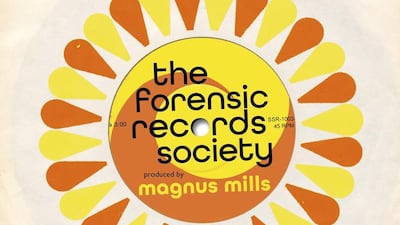If, like me, one of your pet hates is seeing people listening to music through earbuds while reading a book (how can they possibly be giving both art forms the requisite attention?), you’ll sympathise with the two main protagonists of Magnus Mills’s latest comedy.
The book’s unnamed narrator and his mysterious friend James are the founders of the Forensic Records Society, a club which meets in the back room of their local pub, the Half Moon, to listen to vinyl records in the most stringent of circumstances. Comment or critique is strictly forbidden during each meeting. Instead, each of the club’s all-male members simply takes turns playing the singles they’ve brought with them to a rapt handful of fellow devotees.
Broadly speaking, Mills is clearly satirising the geeky quirks and foibles of your typical vinyl-obsessed bloke. To that extent, one is reminded of Nick Hornby's 1995, record-shop set novel High Fidelity. But with its deadpan wit, and its typically Millsian knack for finding the absurd in the everyday, The Forensic Records Society is a more subtle, eccentric and skilfully-rendered read. Like many of Mills's novels, it's a farce of sorts, each little plot twist further endangering the teetering house of cards that is the book's titular club.
The first sign of trouble for the forensics comes when a record-listening group that allows – indeed actively encourages – discussion announces it will hold a rival night at the Half Moon on Tuesdays. The Confessional Records Society, as it known, is run by Phillip, a charismatic and ultimately somewhat messianic figure whose motivation, we understand, has something to do with James not allowing him entry to a previous forensics meeting when he was a few minutes late.
Much to James’s chagrin, the Confessional Records Society – “Bring a record of your choice and confess!” runs its simple credo – instantly proves much more popular than the Forensic Records Society, and is also a huge hit with the women, who return from the Half Moon’s back room wearing T-shirts proclaiming “I confessed.”
The way that Mills’s latest book demarcates the different ways in which men and women tend to consume music is insightful and amusing, the point being that, generally speaking, women’s relationship with popular music seems to be more joyful and far less anal-retentive.
James, who is at one point found attempting to play his entire record collection in alphabetical order, perhaps captures it best: “She thinks we’re all emotionally retarded”, he says, relaying a comment that Alice, a singer-songwriter and barmaid at the Half Moon, has made about him and his fellow forensics.
As further factions emerge and James and the book's narrator struggle to preserve what they see as the impeccable standards of the Forensic Records Society (and its ever-shrinking membership), Mills continues to delight the reader. It's a neat device that all of the records played in the book are only ever referred to by their song titles. Thus you find yourself stupidly pleased, just as a member of the forensics might be, when you know who recorded one of the more obscure records mentioned, or when Mike, one of their number, says "What's all this about leaving a cake out in the rain?" and you know he is referring to the gnomic lyric of American songwriter Jimmy Webb's MacArthur Park.
As is typical for Mills, each character in the Forensic Records Society is painted with the broadest of brushstrokes. We don't know what they look like, far less what their back stories might be. Mills's unique and addictive literary style engages through other means. Teasing and delayed gratification are firm favourites, hence the thing you expect/want to happen only happens much later or doesn't happen at all.
The author also elicits a strange pleasure through repetition. His characters often repeat the same action or return to chunks of dialogue they’ve already said. The effect is like an exploded catchphrase or an in-joke, but you welcome it.
If you’ve ever obsessed about records, you’ll find plenty to laugh at here, but Mills’s masterful comedy also alights on little pockets of profundity. Musing on the differences between the attendees of the Confessional Records Society and the beleaguered bods of the Forensic Records Society, the book’s unnamed narrator reflects thus: “For reasons of their own, they regarded records in a completely different light to us. They viewed them as little more than props and accessories, and saw no intrinsic value in the records themselves. Accordingly there existed a gulf between the two persuasions which could never be bridged.”
James McNair is a frequent contributor to The Review.

